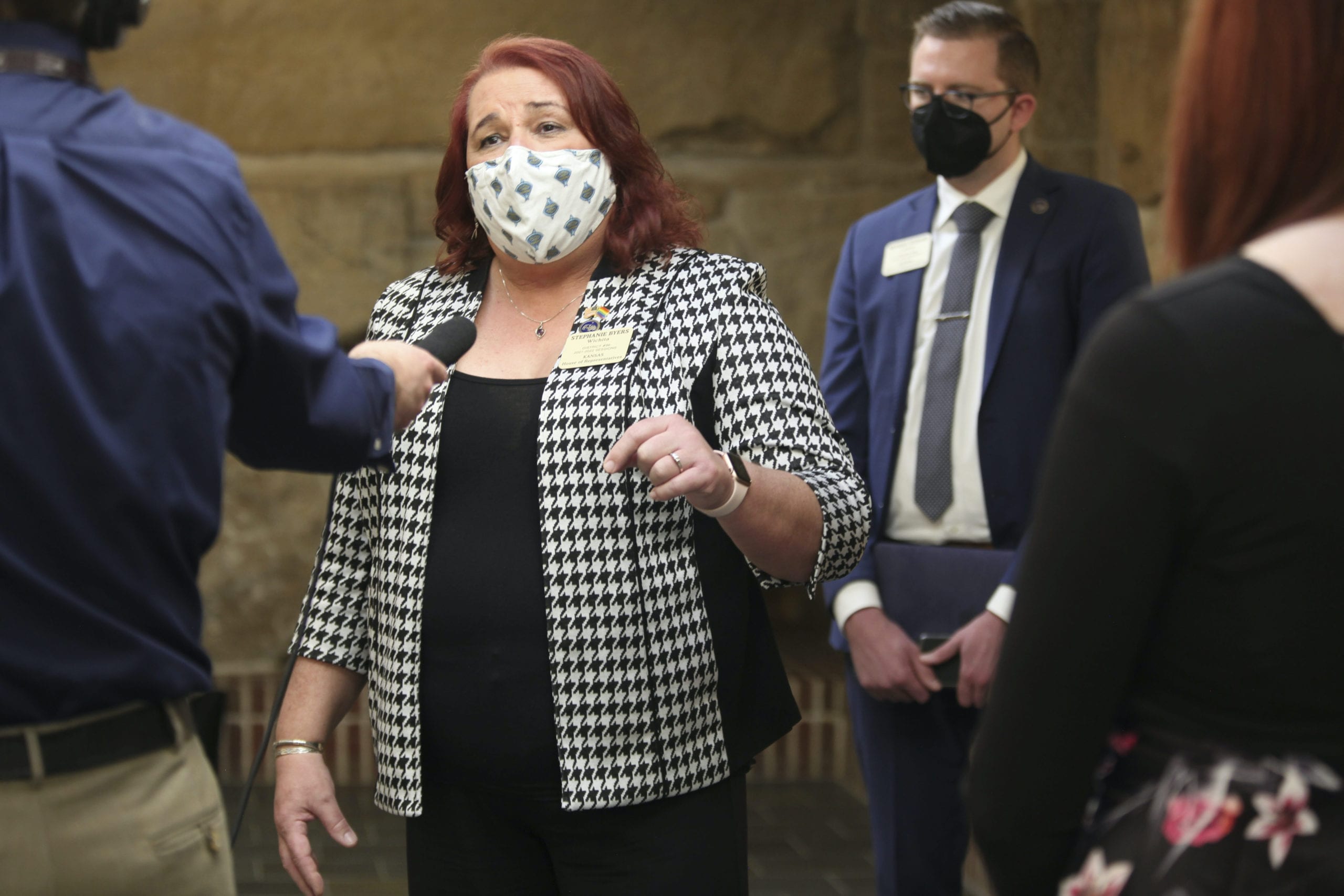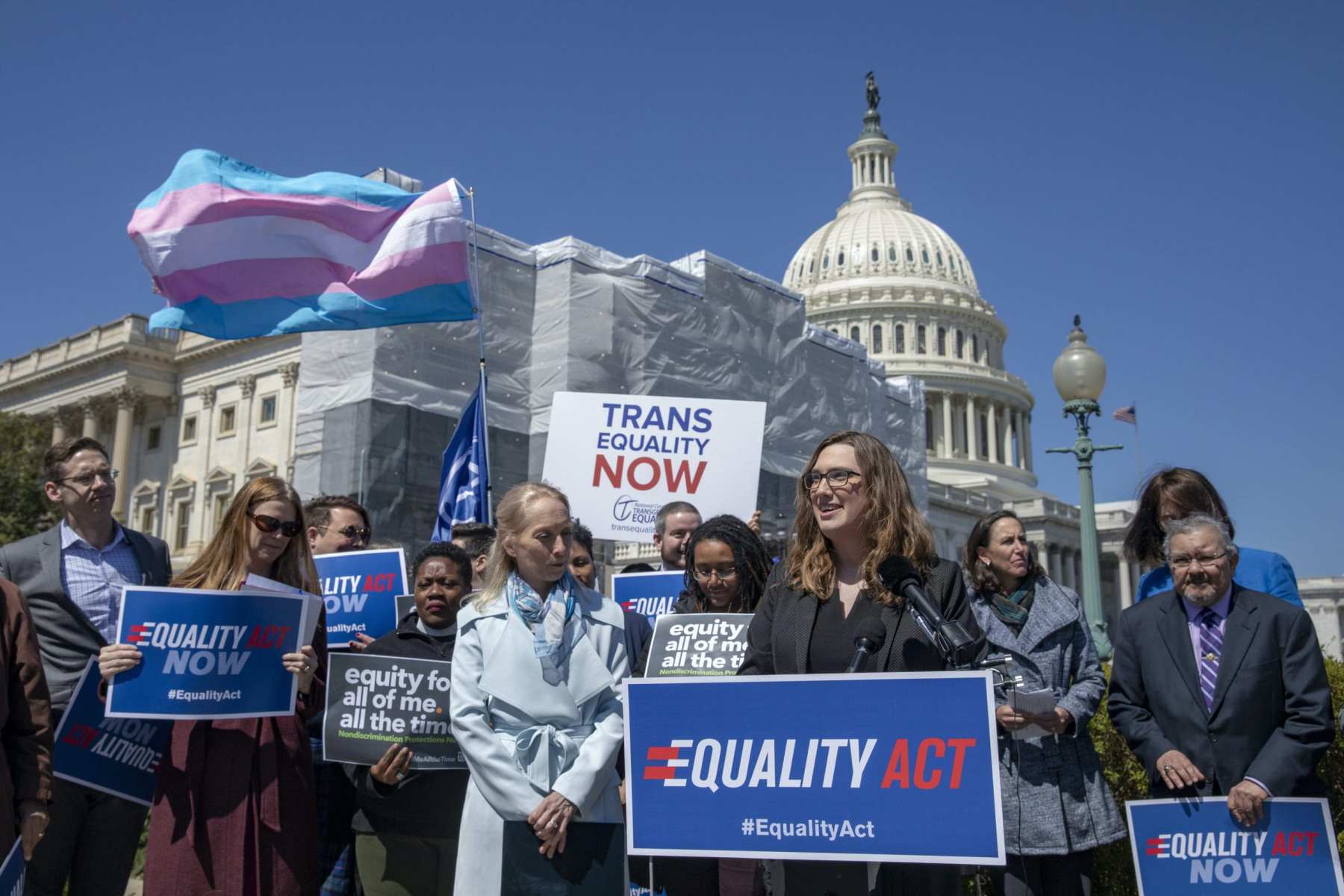In February, Stephanie Byers stood at a podium inside the Kansas Capitol expressing opposition to a bill that would ban transgender athletes from playing in girls’ and women’s sports. At least 65 similar bills were filed in statehouses around the country this year.
Byers, a Democratic state representative, knew one of the state lawmakers who was among the most vocal advocates for the bill; they went to college together in the 1980s. For Byers — who last November became the first out trans lawmaker in Kansas and the country’s first out trans person of color to be elected as a state legislator — it was difficult to not take it personally.
“It was hard not to separate the idea that this may have possibly been directed directly at me,” said the 58-year-old former public school teacher. “I know that’s not the case. I know that if I had not been there, if I had not run for office or if I had not won my election, that bill still would have come through. But it is kind of difficult because it seems like it’s coming straight at you.”
Byers is one of eight out transgender people serving in statehouses this year — a figure doubled by the 2020 election. The increased representation comes as legislators filed more than 250 anti-LGBTQ+ bills this year. Lawmakers in more than 30 states introduced bills to ban trans youth from playing sports that align with their gender identity; they’ve filed at least 35 bills aimed at banning minors from accessing gender-affirming medical care. Some of those bills have been signed into law and face litigation.
“As anti-trans legislation was introduced in state legislatures across the nation, it has been a deeply personal and emotional year for our trans state lawmakers,” said Elliot Imse, the senior communications director for Victory Fund, which helps LGBTQ+ candidates run for office. “But they are fighting and leading the way on these issues regardless.”
In Vermont, state Rep. Taylor Small recounted attending virtual legislative meetings this year where new colleagues sometimes used the wrong pronouns to identify her. But the state’s first out trans legislator was pleasantly surprised when fellow lawmakers either stepped in to correct their colleagues or acknowledged their mistakes.
“When a mis-pronouning happened, it was addressed immediately. There was an apology,” the 27-year-old said. “There was never this intentional misgendering that came up, which is honestly what I was most nervous about — was not being embraced within a statehouse, and having to really stake my claim to be able to make change happen.”
Sarah McBride of Delaware, the country’s first out trans state senator, used her first year to help launch the legislature’s first LGBTQ legislative caucus. But McBride, a member of the state’s Progressive and Democratic parties, also chairs a key health committee working on issues like vaccine distribution, and she’s advocating for paid family and medical leave, protections for religious minorities and home health care.

“On a day-to-day basis I’m not thinking about my identity in any particular sense. I’m thinking about what experiences as a whole do I bring to the table,” the 30-year-old Democrat said. “What experiences in the community that I represent — in the first Senate District — am I bringing to the table? And how do we advance legislation on all of the issues that Delawareans need progress on?”
In Vermont, Small used her lived experiences to educate colleagues. While debating a bill that she helped introduce that would prohibit using someone’s actual or perceived sexual orientation or gender as a so-called “panic” defense in criminal cases, Small said some of her colleagues brought up hypotheticals that framed LGBTQ+ people as instigators. Small reminded them that the legislation was aimed at protecting LGBTQ+ people.
“I think that really put it in the moment for them,” said Small. “To say, ‘OK, we’re done with the hypotheticals. This is really an impact for the community.’”
Lawmakers in the Democratic-controlled Vermont statehouse ultimately passed the bill unanimously, and Republican Gov. Phil Scott signed it into law in early May. Days later, Scott sent Small a letter acknowledging her work on the bill, and included the pen he used to sign the bill into law. Small said that she was surprised to have a bill she authored get signed into law her first year in office, and that she’s grateful it’s this one, which she believes will build trust and encourage survivors and victims to come forward. (At least 15 statehouses have approved similar bans).
“I have to say it was the warmest welcome that I could have asked for in coming into the legislature,” she said.
McBride said years of work by Delaware activists fighting for LGBTQ+ protections meant her legislature was in many ways prepared to welcome trans colleagues. But she recognizes that isn’t the case for others. When Danica Roem was elected to the Virginia legislature in 2017, for example, Republicans announced plans to end the centuries-old practice of using gendered titles for lawmakers, a move that some believed was in response to questions about how they would address Roem. Roem was the first out transgender person to be elected and sworn into a statehouse.
“The debates that we’re seeing in a lot of other legislatures I think underscore how powerful having trans people in public office could be in shifting the debate, in shifting the priorities, in shifting what’s possible,” McBride said. “And I think other trans legislators are seeing that as well.”
McBride has tried to savor joyous moments. She recalled being sworn into office by an LGBTQ+ judge while two trans teenagers stood by.
“It was, to me, a very clear reflection of the progress that we’ve made,” she said. “It’s not evenly felt, and it’s certainly not the end of the road by any stretch of the imagination. But that mere image would have seemed so impossible that it was almost incomprehensible even a decade ago.”
In Kansas, Byers has focused on bringing her lived experience outside of being trans to her leadership on LGBTQ+ issues. During her testimony in February, Byers — a member of the Chickasaw Nation and the first out trans Native American elected official in the country — highlighted what she saw as parallels to past discrimination against her ancestors, “all because we were different than what was then mainstream America.”
“We’re not seeing new arguments on discrimination,” Byers said in an interview with The 19th. “What we are seeing is a new subject to that discrimination.”
The Republican-controlled Kansas statehouse passed the anti-trans sports bill Byers spoke out against in April. Gov. Laura Kelly, a Democrat, vetoed it. By one vote, lawmakers in the Senate failed to overturn the veto. A separate bill to ban gender-affirming care for trans youth did not advance.
Byers said up until the last days of the legislative session, she worried about rumors that lawmakers would try to revive an anti-trans bill. But after the bills failed, Byers said some Republican colleagues reached out to her privately to explain why they voted the way they did — or to apologize.
“It signifies politicians who are out of touch with their constituency,” she said. “They know where their constituents are on this, and yet they’re afraid that in order to stay in power they have to agree with these heinous ideas.”
Small, the Vermont lawmaker, acknowledged the contrasting experiences trans elected officials have, depending on the state they represent. Rep. Brianna Titone, for example, the first trans state lawmaker in Colorado, has spoken out about experiencing homophobic attacks on the campaign trail.
Small is serving in a legislature where lawmakers did not debate anti-trans legislation — and she hopes to advance a trans youth bill of rights next session.
“The fight was to affirm the rights of LGBTQ folks in our state — not fight to prevent rights,” she said.
Byers said she hopes to keep prioritizing LGBTQ+ policy in the future, including proposals to ban gay and trans conversion therapy, and to expand discrimination protections on the basis of sexual orientation and gender identity. She noted the work of Small, Titone and Roem, who helped pass a similar “panic defense” ban in Virginia.
“We serve where we serve, we do what we can. It’s important to note the contrast. But it’s also important to note that we are all making in-roads. It has to start somewhere,” Byers said. “As I said on the House floor here in Kansas, there are 125 state legislators now in Kansas that can no longer say, ‘I don’t know a trans person.’”






